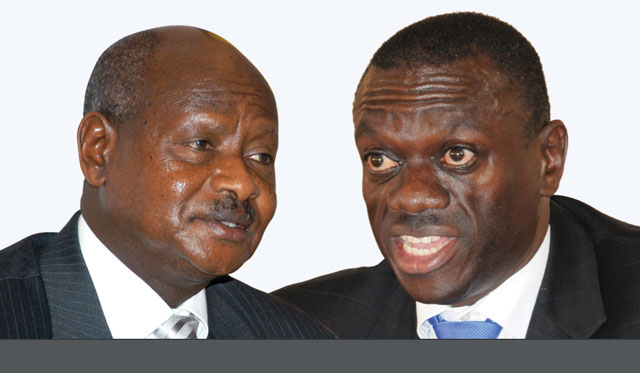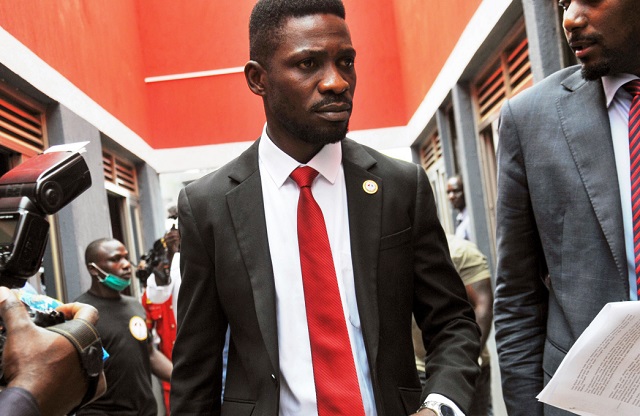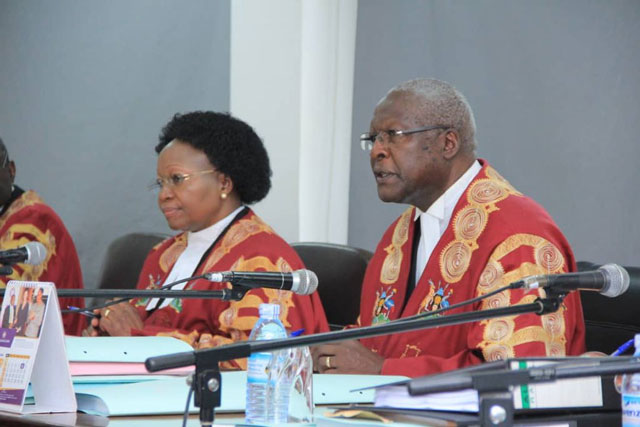
Court has set Thursday, February 11 as the day to meet with all the parties to agree on the matters that are going to be determined in the hearing. The court is expected to give its verdict not later than March 17.
ANALYSIS | BAKER BATTE | It is almost 20 years now since the 2001 presidential election which is remembered by many as the most violent and bloody election in Uganda’s history. Many of the players in 2001 remain on the scene, albeit with new challengers.
The 2001 election presented the first major challenge to President Yoweri Museveni when Dr Kiiza Besigye who was his personal physician during the five-year liberation struggle contested against him. Museveni won the election with 69 percent of the vote while Besigye polled 27 percent of the total votes cast.
After the election, Besigye ran to court alleging that the election was nothing but a sham. He argued that all the provisions in the law books governing elections were thrown in the trash can and what was organized was nothing but a mockery of the election the law talks about as free and fair.
In Presidential Petition No. of 2001, Besigye, the petitioner made very many complaints against the two respondents, Yoweri Kaguta Museveni and the Electoral Commission. He alleged that the Electoral Commission failed to efficiently compile, maintain and update the national voters register, failed to publish a list of all polling stations within the prescribed period, increased the number of polling stations on the eve of polling day, allowed or failed to prevent stuffing of ballot boxes, multiple voting and under-age voting.
He also said that the Electoral Commission failed to protect his polling agents from being chased away from polling stations and counting and tallying centres. It failed to stop Museveni’s agents to interfere with his electioneering activities, allowed armed people to be present at polling stations, and falsified results among others.
Besigye also claimed that Museveni had personally or through his agent’s committed illegal practices and offences. These include the publication of a false statement that he was a victim of AIDS, offered gifts to voters, appointed partisan senior military officers and partisan sections of the army to take charge of security during the elections, allowed groups such as that of Major Roland Kakooza Mutale, Kalangala Action Plan, to use violence against those who did not support Museveni among other complaints.
When court that was presided over by a Coram of five Justices that included the Chief Justice then Benjamin Odoki, Arthur Oder, Joseph Mulenga, Alfred Karokora and Wilson Tsekooko, sat to agree on the matters that should be determined, five issues were agreed upon.
The five were;
- Whether during the 2001 election of the President, there was non-compliance with provisions of the Presidential Elections Act 2000
- Whether the said election was not conducted in accordance with the principles laid down in the provisions of the Presidential Act,
- Whether if the first and second issues are answered in the affirmative, such non-compliance with the provisions and principles of the said Act affected the result of the election in a substantial manner.
- The fourth issue was; whether an illegal practice or any other offence under the said Act was committed in connection with the said election by Museveni personally or with his knowledge and consent or approval
- The fifth issue was what reliefs are available to the parties? The Court unanimously agreed that indeed there was non compliance with provisions of the Presidential Elections Act and that the election was not conducted in accordance with the principles laid down in the law.
However, the judges disagreed on whether such non-compliance affected the outcome of the election in a substantial manner.
“By a majority of three to two, that it was not proved to the satisfaction of the Court that the failure to comply with the provisions of, and principles laid down in the said Act, as found in the first and second issues, affected the result of the election in a substantial manner,” the judgement presented by Odoki reads in part.

Odoki was joined by Mulenga and Karokora to uphold Museveni’s victory while Oder and Tsekooko had annulled the election. Five years later in 2006, there was another election on February 23, with the same major actors. The election was held in almost similar circumstances like that of 2001. Besigye still ran to court after the Electoral Commission returned Yoweri Museveni as the president-elect with 59 percent of the valid votes against Besigye’s 37 percent.
Like in the 2001 petition, the five justices who ruled had now been joined by two others, George Kanyeihamba and Bart Katureebe, and they unanimously ruled that there was non-compliance with the provisions of the Constitution, Presidential Elections Act, and the Electoral Commission’s Act.
The Justices also unanimously found that the election was neither free nor fair. However, in a decision of 4:3, the Justices ruled that although the election was neither free nor fair and not conducted according to the dictates of the law, the non-compliance did not affect the outcome of the election in a substantial manner.
Each of the two entrants on the Coram, Katureebe and Kanyeihamba split their vote with the latter voting with those annulling the election while the former with those upholding the election. The 2006 Justices ruled the same way they had ruled in 2001. Besigye was devastated and vowed never to go back to court to challenge an election.
Constitutionality of Substantial effect clause, but as Besigye was raving and raging over the two judgements of the Supreme Court in 2009, he found time to run to the Constitutional Court to challenge the constitutionality of Section 59 (6) (a) of the Presidential Elections Act.
The section provides that: ‘The election of a candidate as president shall only be annulled on any of the following grounds if proved to the satisfaction of the court- (a) …if the court is satisfied that the election was not conducted in accordance with the principles laid down in those provisions and that the non-compliance affected the results of the election in a substantial manner.’
Besigye argued that that provision contravened Article 104 (1) of the Constitution which provides that: ‘Subject to the provision of this Article, any aggrieved candidate may petition the Supreme Court for an order that a candidate declared by the electoral commission elected president was not validly elected.”

He argued in his petition that was heard by five Justices of the Constitutional Court; Prof. Lilian Tibatemwa Ekirikubinza, Augustine Nshimye Sebuturo, Rubby Opio-Aweri, Eldad Mwangusya and Geoffrey Kiryabwire, that parliament acted beyond its powers by introducing the substantial effect in the clause hence tying the hands of the judiciary from making an independent decision regarding presidential election petitions.
The justices argued that in their view, what amounts to a president being validly elected is a question of fact and law. “As a matter of good governance, the test to be applied must be objective so that the ultimate result obtains acceptability from the electorate.
If the test threshold is too low, then the final result of the election would not obtain the required legitimacy. In a democracy, the benchmark for the test can be varied from time to time within acceptable standards to reflect an improvement in governance,” the Judgment that was issued 20 days to the 2016 presidential elections that were held on February 18, reads in part.
The Justices added that doing away with Section 59(6)(a) would mean lowering the standard of proof of presidential election petitions and any slight form of non-compliance would be argued to be sufficient to annul presidential elections. “Not forgetting that this is the highest office in the country, every presidential contestant would run to court for redress which would seriously impact on the political and economic stability of our country…By inserting the Section in the Uganda law, the legislators had a rationale behind it and the courts ought to interpret it as it is.”
Besigye is now in the backseat while Robert Kyagulanyi Ssentamu of the National Unity Platform-NUP takes the mantle. After a hotly contested race, Kyagulanyi came second after Yoweri Museveni, receiving 35 percent of the total votes cast according to results released by the Electoral Commission. He challenged the results and the matter is now in the same court.
Speaking to a group of politicians from greater Mukono area who were elected on his party card, Kyagulanyi said they have overwhelming evidence to not only prove that the election was not organized according to the provisions of the law but also that the non-compliance affected the outcome of the election in a substantial manner.
“About 10,000 of our Declaration of Results Forms were confiscated by the police but we have another 20,000 others. We are going to prove to the court that we indeed won this election. We know the challenges of filing a petition in courts that are controlled by Mr Museveni but we must also put them to test,” Kyagulanyi said.
Court has set Thursday, February 11 as the day to meet with all the parties to agree on the matters that are going to be determined in the hearing. The court is expected to give its verdict not later than March 17.
******
URN
The post Substantiality: The test which will lift or sink Kyagulanyi’s petition appeared first on The Independent Uganda:.
from The Independent Uganda: https://ift.tt/3q9qMXz
0 Comments